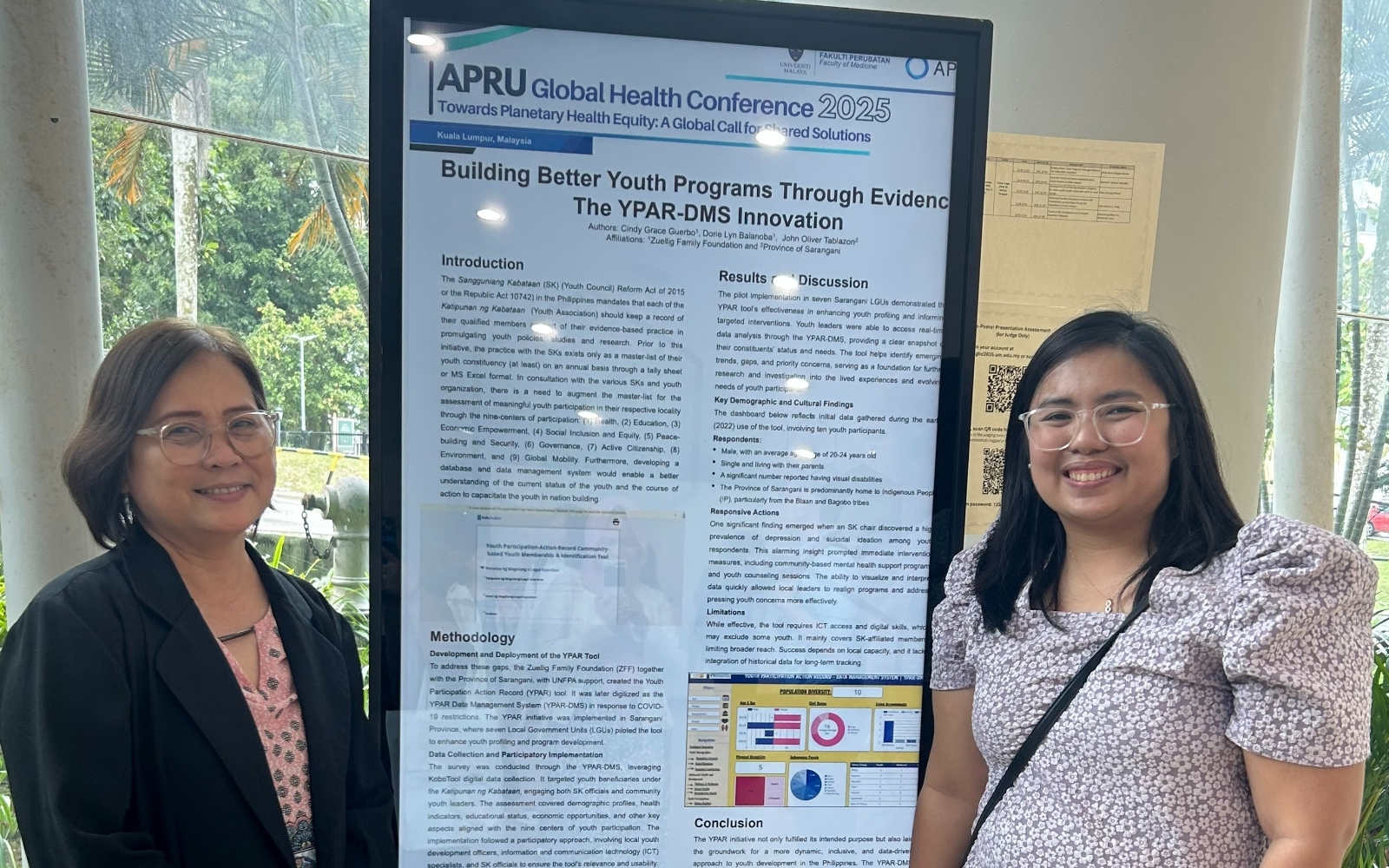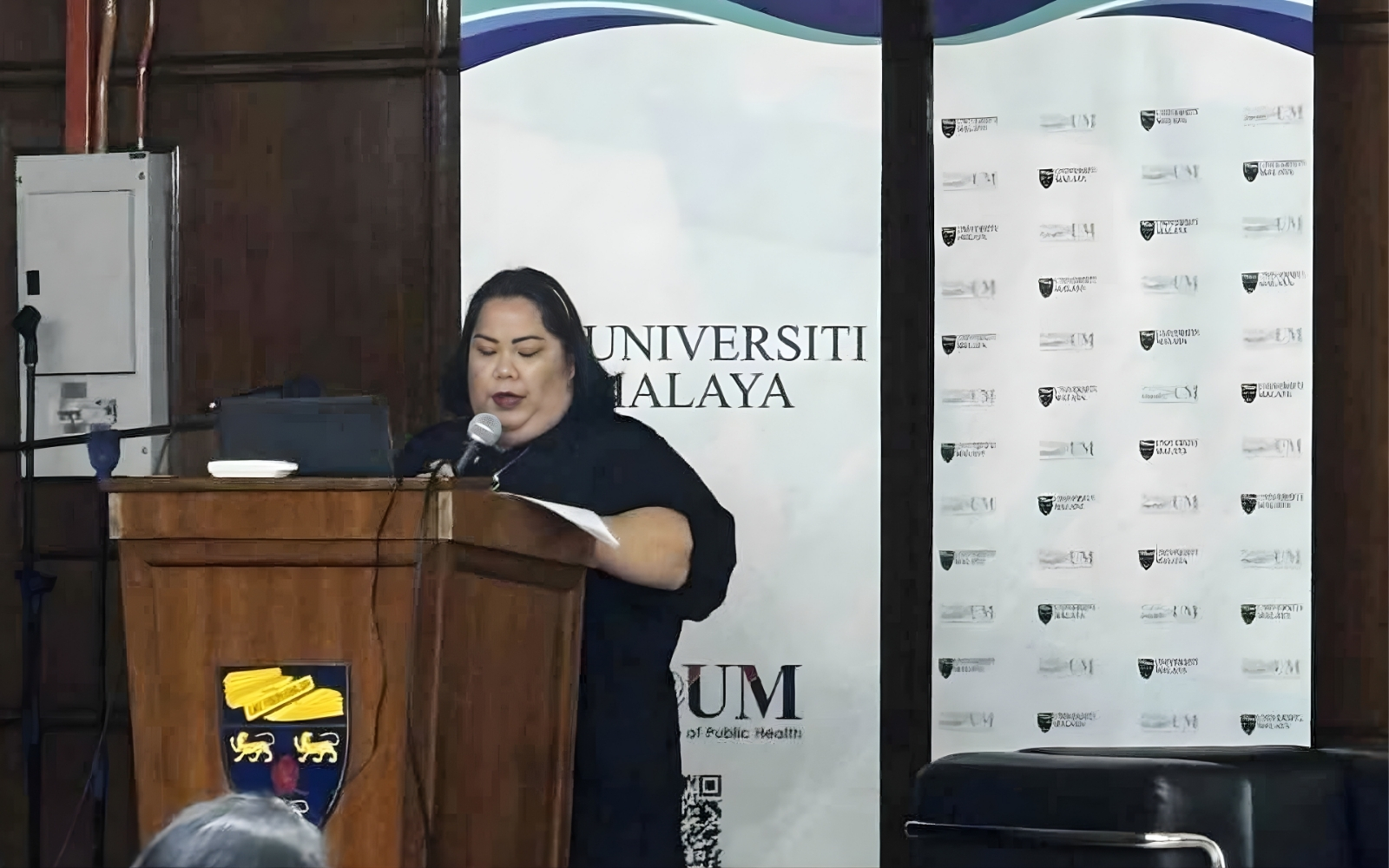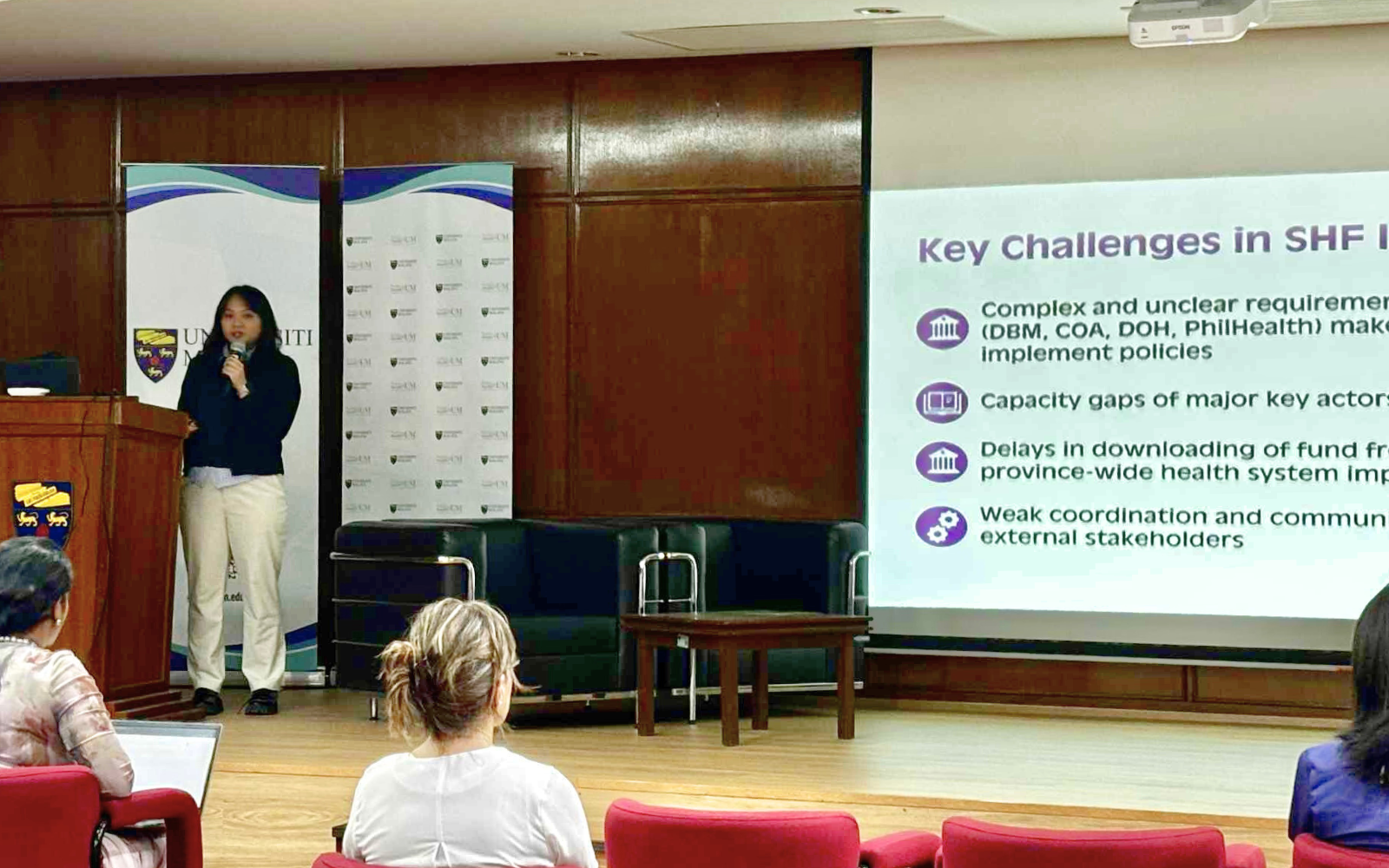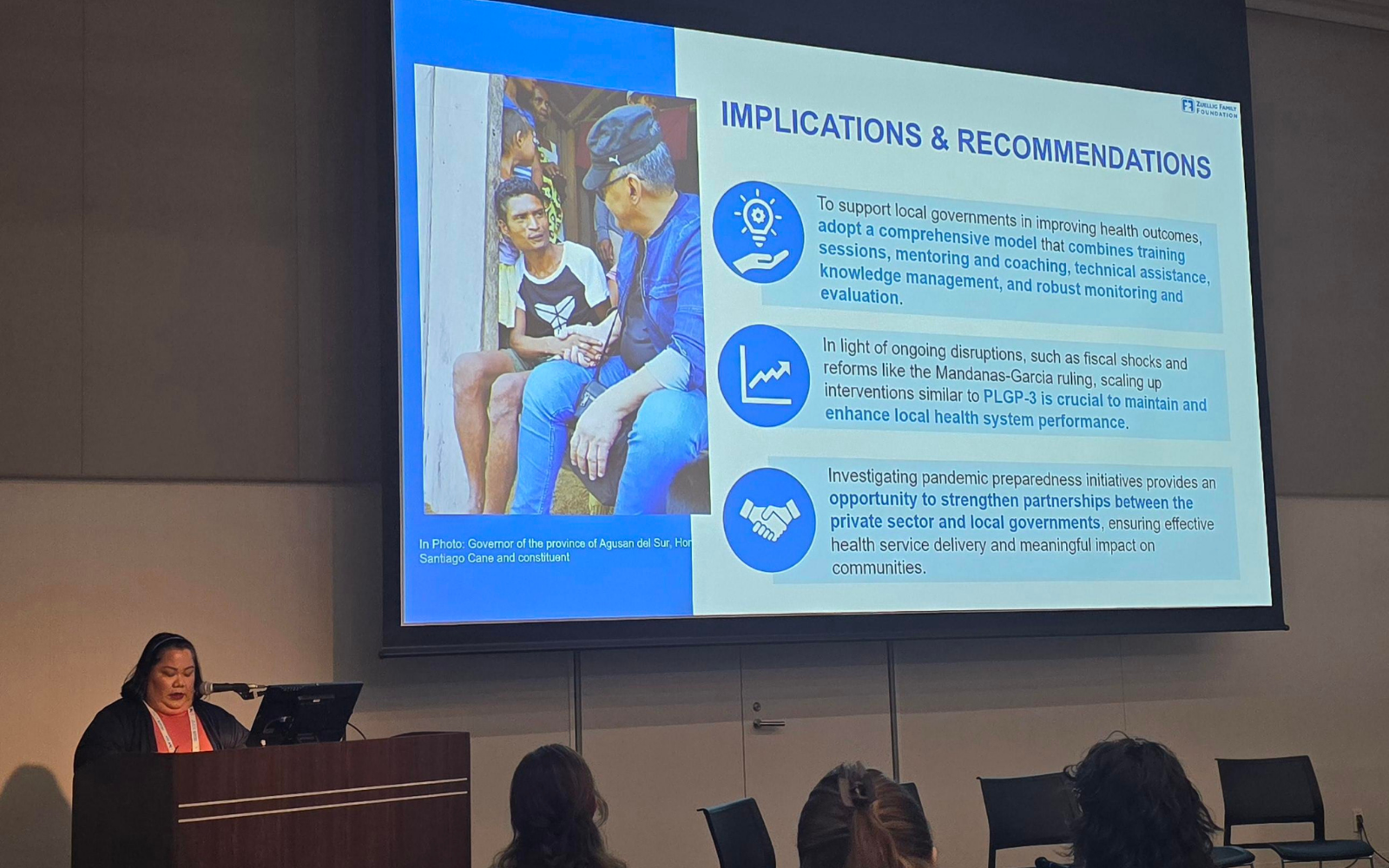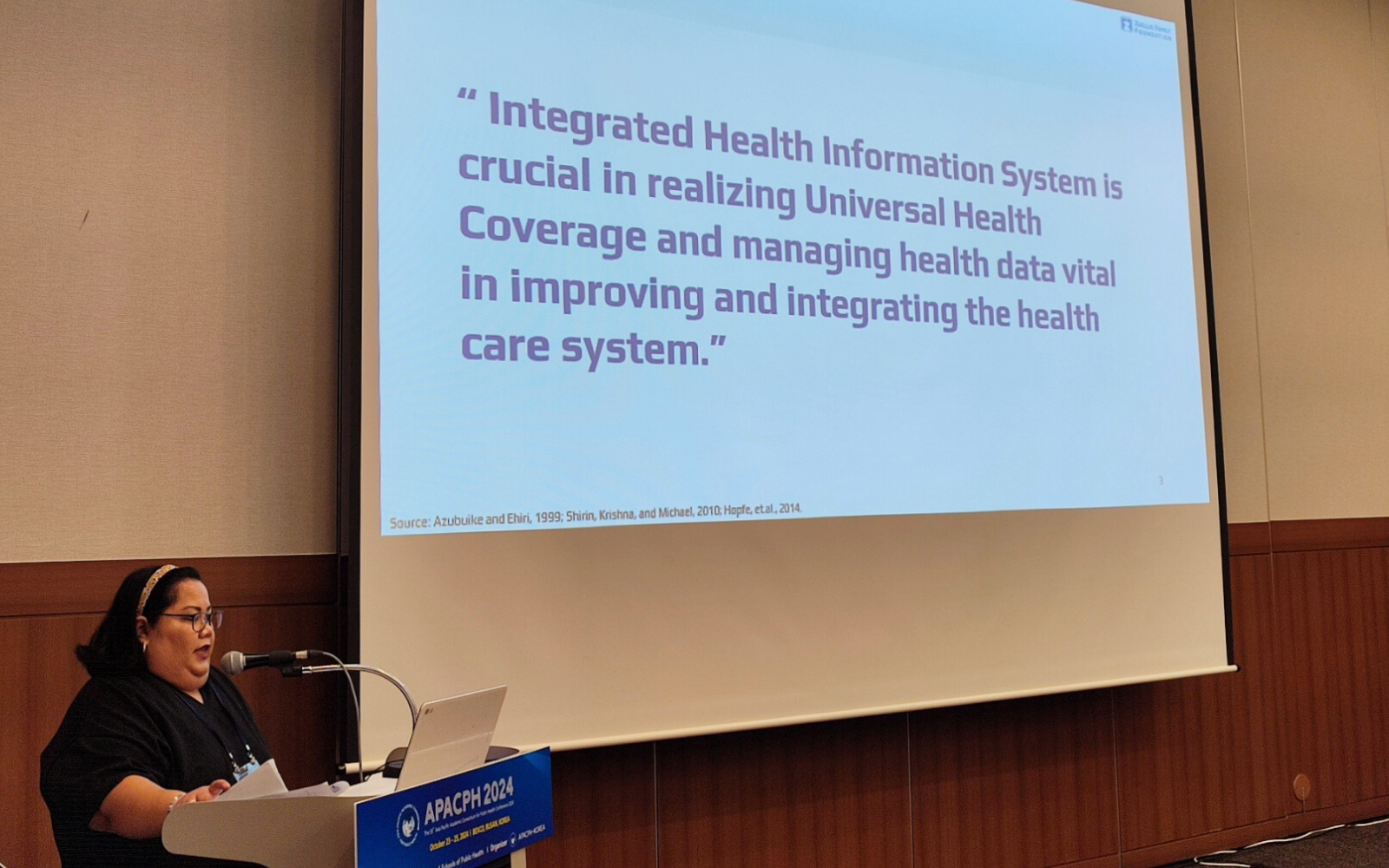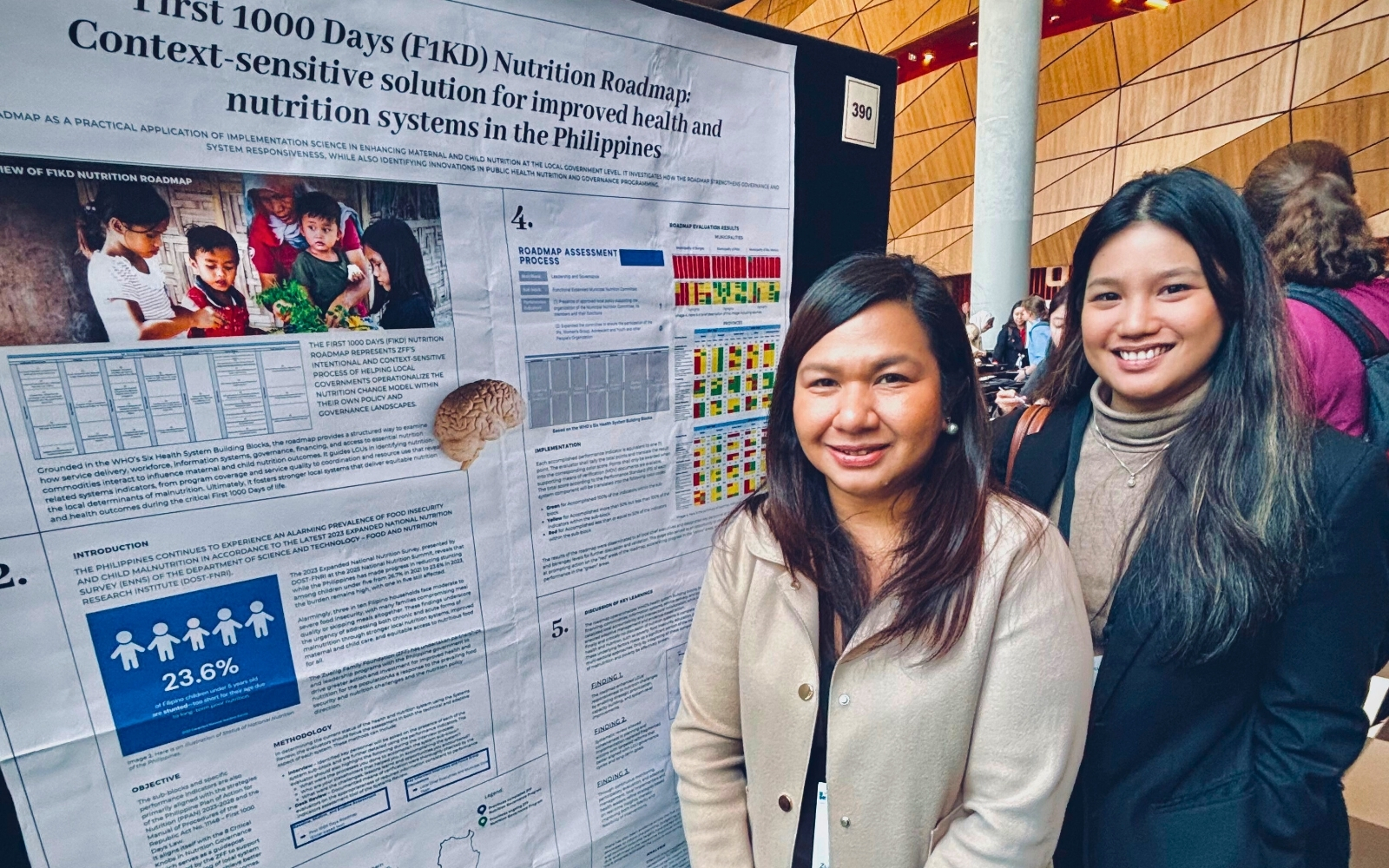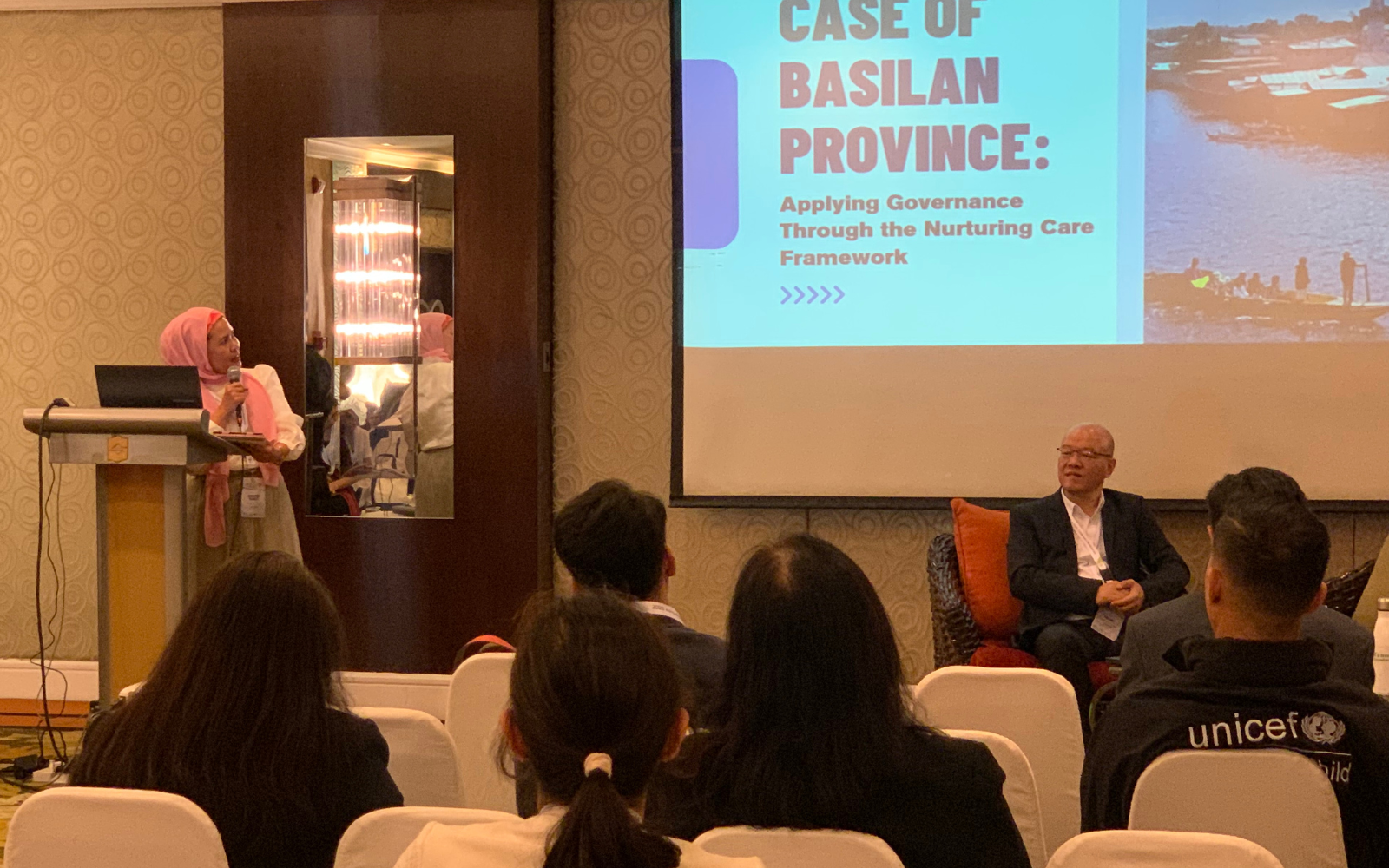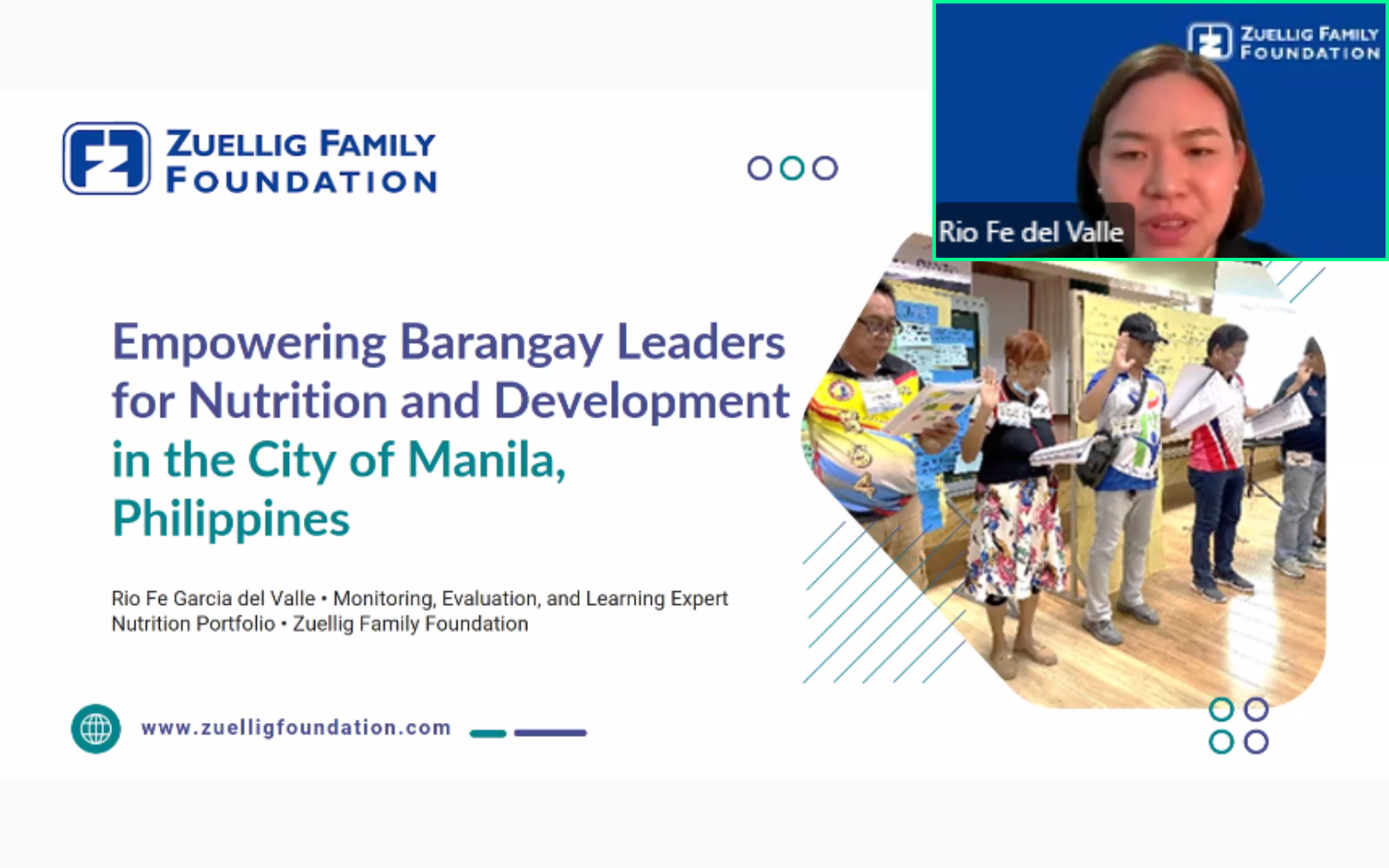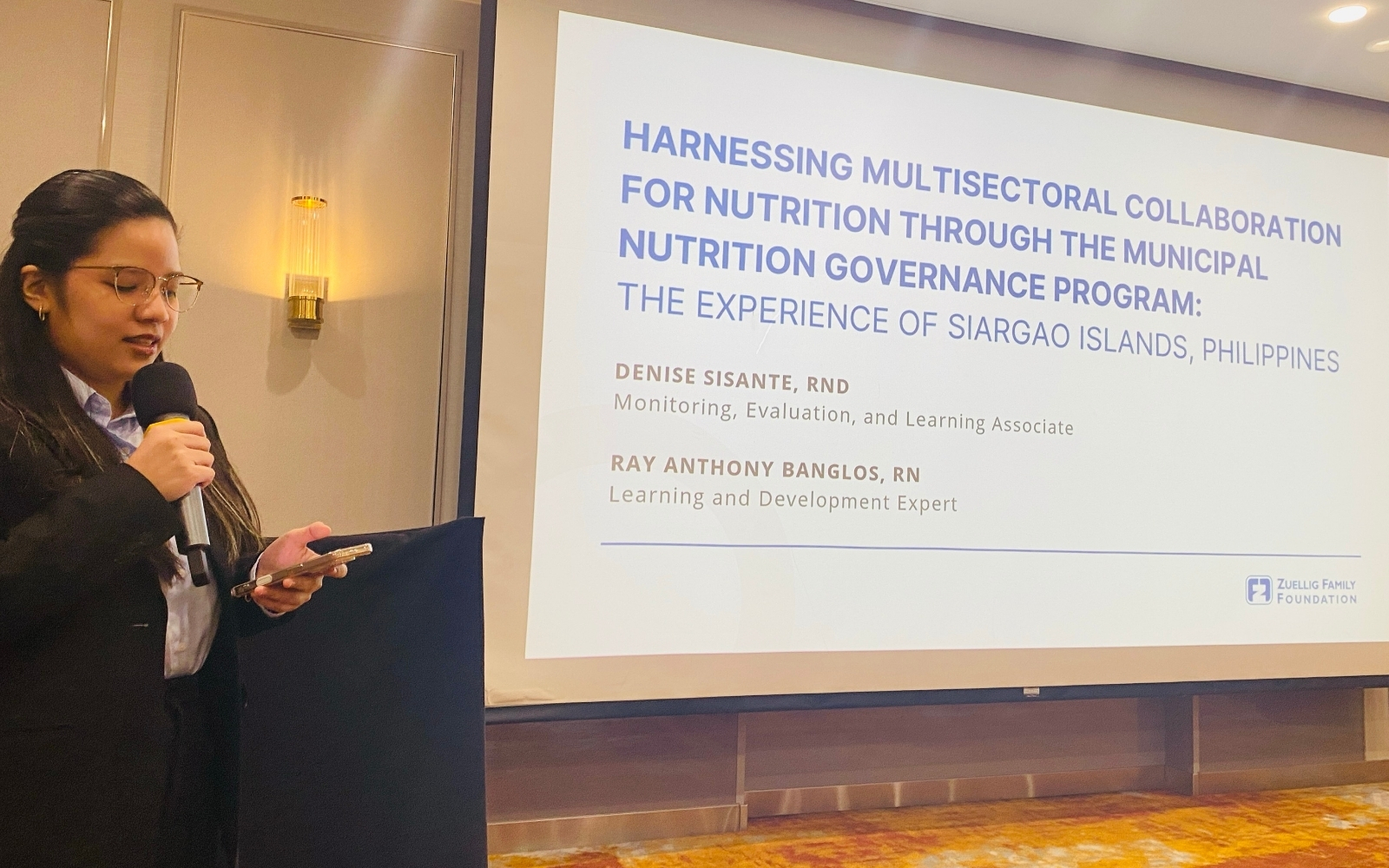Never-ending Learning Process: Dr. Autajay’s Universal Health Care Journey
Dr. Feman Rene Autajay’s storied career in healthcare is marked by continuous learning. “In my 28 years of service, 23 years were spent as a Department of Health (DOH) representative to local government units (LGUs). I have learned so much about the different styles of governance and how to adopt them, to dance the way of politics, but still stick to your principles.”
Programs for Steady Progress
Upon leaving his position as a Medical Officer for a hospital in Antique, Dr. Autajay decided to go into public healthcare when he transferred to Aklan. Filled with idealism and promise, Dr. Autajay supported Aklan’s series of innovative initiatives. He consistently participated in Provincial Health Board meetings, a platform for deliberating on and aligning Universal Health Care (UHC) implementation tactics. He ensured these tactics were synchronized with DOH budget allocation while considering community needs and concerns.
The province addressed health disparities among indigenous groups and underserved communities. By deploying Doctors to the Barrios (DTTBs) to serve the health needs of the Indigenous Peoples (Ati) in Boracay and mainland Malay, the province ensured access to vital healthcare services and also significantly enhanced their health outcomes, aligning with UHC’s objective of equal healthcare access and showcasing his dedication to health equity.
Dr. Autajay focused on expanding healthcare services by securing funding for infrastructure development. He is instrumental in completing the Yapak Mega Health Center in Boracay to meet the island’s increasing healthcare demands. He also prioritized enhancing the skills of healthcare workers through Basic Life Support (BLS) and First Aid training sessions. This project, backed by the DOH and the Provincial Health Office (PHO), improved the emergency response capabilities of healthcare professionals in Boracay Island and surrounding areas.
Partnership with Zuellig Family Foundation
The Zuellig Family Foundation (ZFF) played a crucial role as a supporter and partner. ZFF’s programs supported the implementation of UHC in Aklan by providing essential technical assistance and resources.
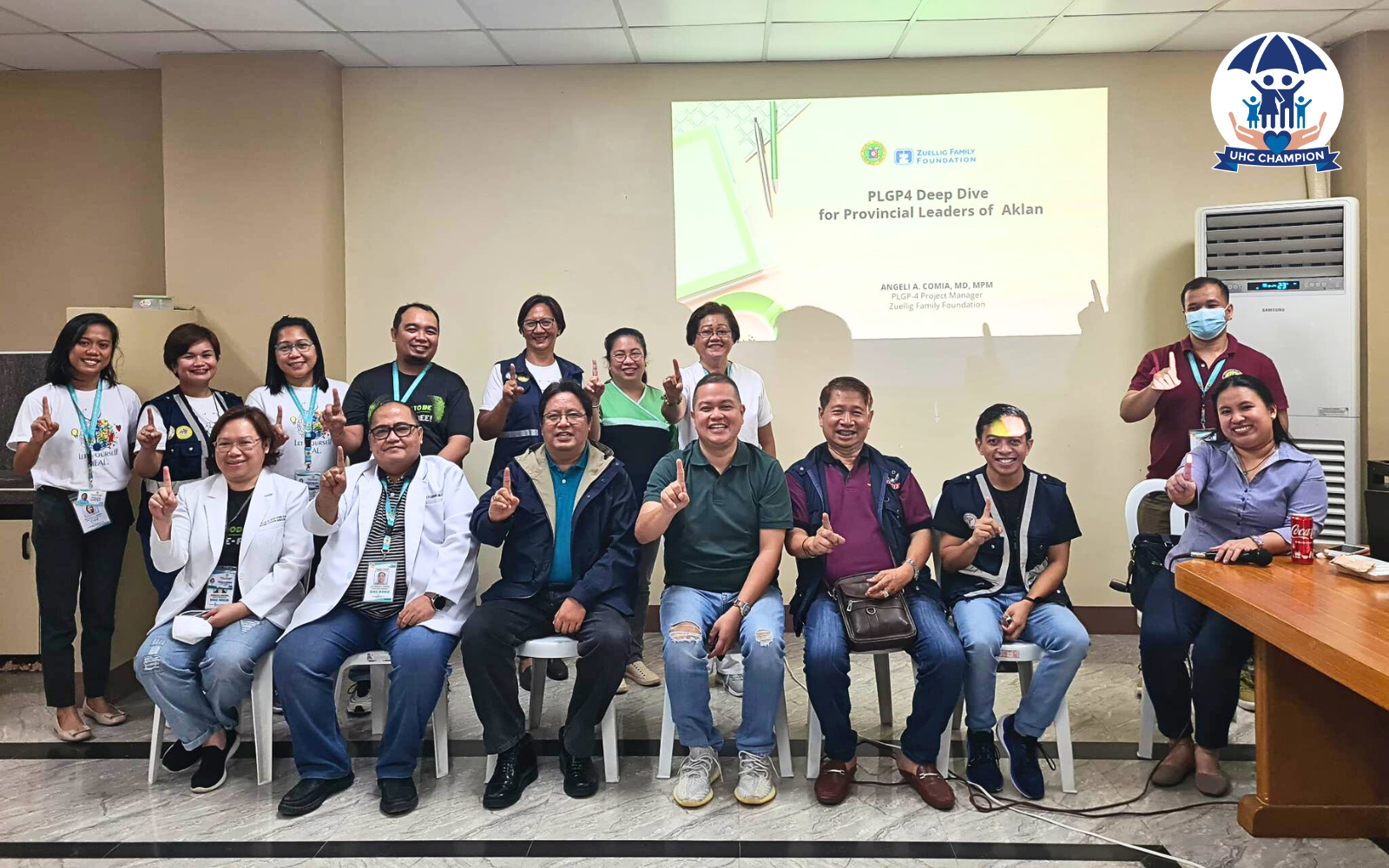
The Foundation’s emphasis on leadership and governance in healthcare also complemented Dr. Autajay’s work. ZFF’s assistance ran parallel to his commitment to upholding the UHC legislation by supporting Aklan’s engagement in the Provincial Leadership and Governance Program (PLGP) when it was introduced in July 2022. His support for the Governor and PHO in completing modules 1 and 2 of the Governor’s Executive Session, helped harmonize local strategies with UHC objectives and resulted in notable enhancements within Aklan’s healthcare system.
Dr. Autajay’s involvement in the Bridging Leadership (BL) orientation workshop alongside appointed Development Management Officers also helped prepare them to guide LGUs under the Municipal Leadership Development Program (MLDP). The program explained the importance of integrating Province-Wide Health System (PHWS) for UHC and sharing UHC grants to build health facilities for the different municipalities. He effectively secured UHC grants to support provincial MLDP modules, with the University of the Philippines Visayas playing a pivotal role as educational partner. All his efforts in fostering a cooperative atmosphere for implementing UHC were all for the province of Aklan.
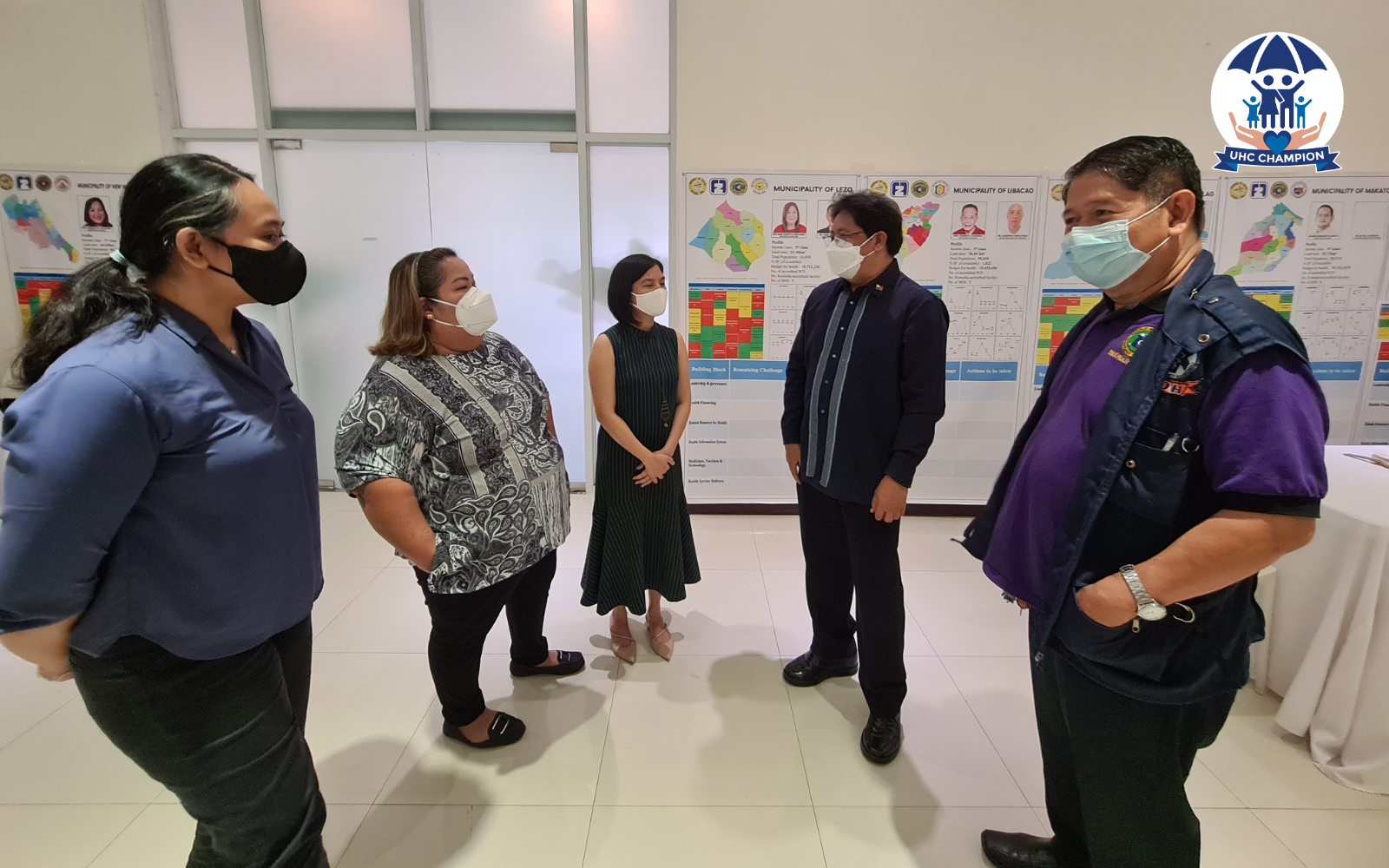
Enhancing Resources and Building Strong Healthcare Networks
With Dr. Autajay’s guidance and the PHO team’s hard work, Aklan has made strides toward enhancing its healthcare infrastructure. This partnership led to the establishment of six District Health Boards in Aklan as model PHWS, Aklan being designated as one of the four Healthcare Provider Network (HCPN) demonstration sites, and the rise in Primary Care Facilities (PCFs), with operational licenses increasing from just one facility to 11 out of 17, aiming for complete coverage by May 2023—proving the importance of collaborations in successfully executing healthcare projects.
Looking to the Future
As Dr. Autajay gets ready for his next role, his contributions to Aklan are a testament to his unwavering dedication to excellence in healthcare. His innovative strategies, partnerships with stakeholders, and commitment to implementing UHC have helped set an example for maximizing learning while navigating the complexities of public healthcare systems. He intends to continue promoting UHC and utilizing his knowledge and skills to oversee healthcare facilities. He says, “I hope those I’ve worked with will continue to feel motivated to help the province. Because if we are not going to act, who else will?”
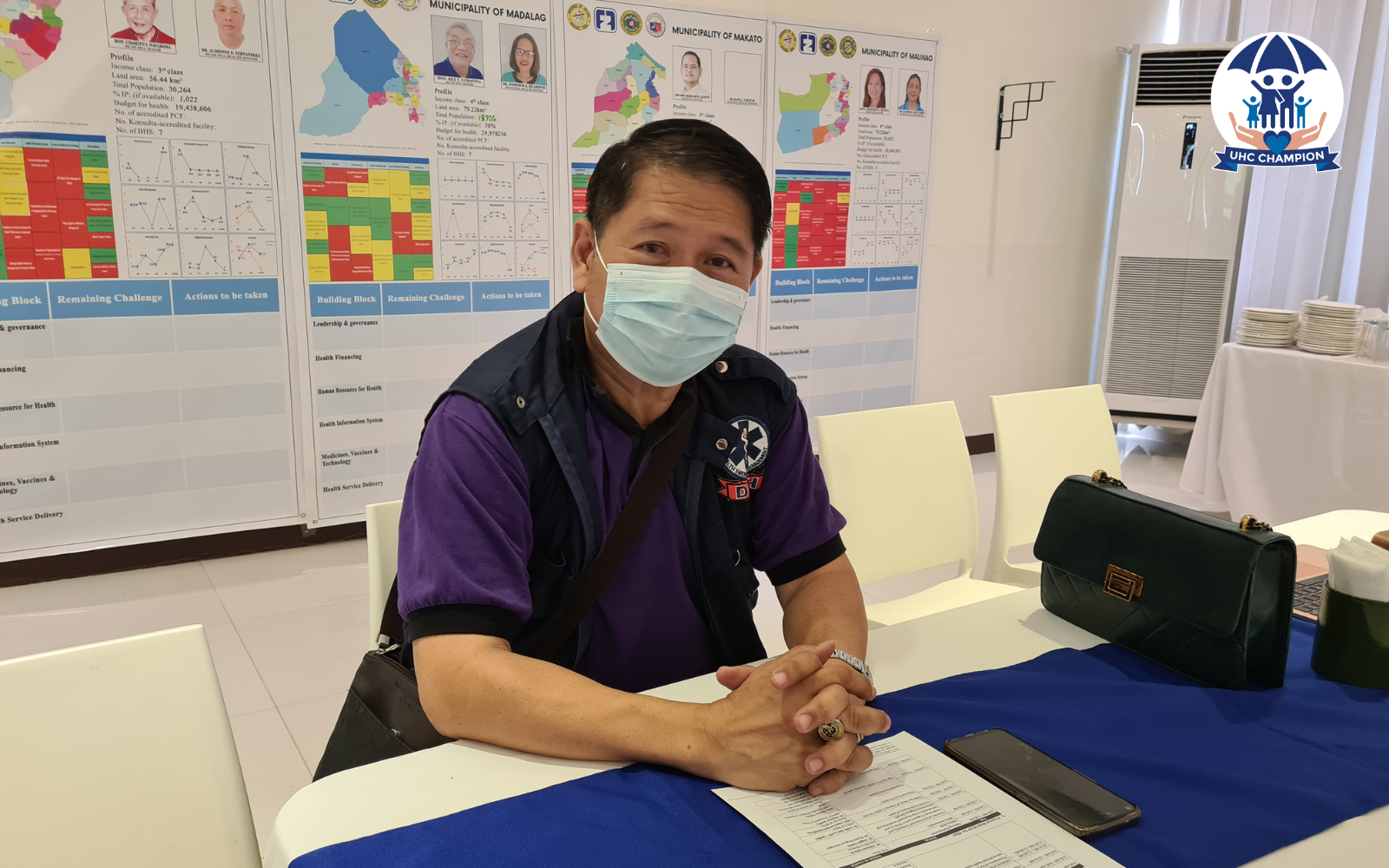
Janriel Lavadia, Cagayan Valley’s Emerging Health Leader
Working for the Department of Health (DOH) is Janriel Lavadia’s first job. A nurse by profession, Lavadia recalls, “My dream was to go into a clinical setting and be a nurse abroad. I was encouraged by some family members to join the DOH, and after some time, I realized that this is my calling.” Born and raised in Tuguegarao City, Cagayan Valley, it was only natural for Lavadia to serve his community.
Lavadia’s journey is marked by dedication and growth. His public health career began in 2013 as support staff for the DOH’s Kalusugan Pangkalahatan program. This initial role gave him a comprehensive understanding of DOH programs and the intricacies of public health. His exemplary performance led to his promotion to health program researcher, where he managed the immunization and disaster response programs of the Disaster Risk Reduction and Management Office (DRRMO).
By 2019, Lavadia was promoted to Universal Health Care (UHC) Regional Coordinator in his region. Lavadia says of his career path, “I guess with the experience I’ve had throughout the years and as a leader, if there’s a way for me to implement the program and how we engaged the different units, they saw I had the potential.” His administrative insights and ability to engage various stakeholders, including national agencies and local government units (LGUs), were recognized. Despite initial apprehensions due to the novelty and complexity of UHC, Lavadia embraced the challenge. “I was afraid to be part of the UHC,” he recalls. “Usually, doctors head the UHC, and there are no clear instructions, but I guess they saw that I don’t give up, so I took on the role.”
A Refreshing Take on Leadership
Leading the UHC initiative was a formidable task that required overcoming numerous hurdles. The transition to UHC needed to be improved, including resource allocation issues and resistance to change. However, appointing a dedicated unit for UHC under a new Regional Director helped streamline the process. This unit became the central hub for coordinating UHC activities, providing technical assistance, and building the capacities of LGUs. His leadership ensured this unit’s effectiveness, fostering collaboration between the central office and LGUs. “The dedicated unit helped push the UHC forward, because there was a way for all stakeholders to understand what was going on and to convene,” Lavadia says.

Implementing UHC is no small feat, especially in a region with diverse needs and challenges. Janriel Lavadia recognized early on that the key to success lies in building trust and fostering a collaborative spirit among all stakeholders. He understood that effective communication was crucial in addressing the concerns and misconceptions surrounding UHC. By organizing regular forums and dialogue sessions, he ensured that every voice was heard and every concern addressed. His ability to foster a sense of ownership among his team members and partners was vital in maintaining motivation and ensuring continuous progress in UHC programs. His active engagement with LGUs and other government agencies advocated for a collaborative approach to health governance, reinforcing his commitment to making UHC a reality in his region.
One of the significant challenges Lavadia faced was the resistance to change. Many local officials and healthcare providers were accustomed to the system and apprehensive about the new UHC framework. To counter this, Janriel helped initiate capacity-building programs. These initiatives aimed to equip local healthcare providers and administrators with the necessary skills and knowledge to implement UHC effectively. He transformed skepticism into support, gradually building a solid foundation for UHC in Region 2.
A Crucial Part of UHC Implementation
In 2022, the Zuellig Family Foundation (ZFF) partnership became instrumental in advancing UHC in Region 2. The programs, focusing on leadership and governance, addressed technical and adaptive challenges. He says, “We’ve included the best practices that we learned from ZFF. What to teach, what to adapt, how to transform those implementing UHC.”
Lavadia acknowledged the significant impact of ZFF’s Bayang Malusog program, emphasizing transformational leadership and adaptive strategies. It provided valuable insights into effective governance and political dynamics, crucial for UHC implementation. “It was a way to make our co-leaders feel that UHC is not just about technical know-how. It’s a way to approach a better way to implement it. I consider it a big help for them.”
Navigating the political landscape of Region 2 was one of Lavadia’s significant challenges. The region’s political rivalries often got in the way of the otherwise smooth integration of UHC programs. Lavadia worked diligently to help bridge these divides, advocating for a unified healthcare approach transcending political affiliations. His and the region’s efforts have resulted in increased cooperation and progress toward UHC goals.

Vision and Legacy
Looking ahead, Lavadia is focused on helping further strengthen the healthcare system in Region 2. Realizing UHC would mean even the most remote and underserved communities can access quality healthcare. He is also keen on building stronger partnerships with private sector stakeholders, recognizing that a collaborative approach is vital for sustainable health improvements.
Lavadia is also committed to continuous learning and adaptation. He believes that staying abreast of global best practices and innovations in healthcare is crucial for successfully implementing UHC. Through encouraging learning and innovation within his team and the broader healthcare community, he aims to help ensure Region 2 remains at the forefront of healthcare advancements.
Janriel Lavadia’s story is about resilience, dedication, and visionary leadership. His journey inspires all those who aspire to make a difference in the field of public health, reminding us that with vision and perseverance, transformative change is possible. “I always have hope. I have always had this vision and will not stop until I get there. I want to create an environment where everyone accepts change.” He says, “No one should be afraid of it. It moves us to where we want to be. What we do now will affect our families and those around us. That’s what motivates me.”
Baguio City: Towards Zero Adolescent Pregnancy
Baguio City is not just known for its cool climate, scenic mountain views, and rich history but also for its pioneering efforts in adolescent health and development. The city has been grappling with the challenges of adolescent pregnancies, which, in 2018, saw an alarming adolescent birth rate (ABR) of 38.9 percent or around 809 girls aged 10 to 19 giving birth that year. This alarming situation prompted immediate action from the local government and concerned offices.
In 2021, Mayor Benjamin Magalong joined The Challenge Initiative (TCI)-Philippines to address this problem. This platform in the country, co-funded and co-implemented by the Zuellig Family Foundation and the Gates Institute for Population and Reproductive Health, aims to improve the family planning and adolescent and youth sexual and reproductive health (AYSRH) services in the city. Through TCI-Philippines, Baguio City began working to lower its ABR and improve health services for adolescents.
Establishing Adolescent-Friendly Health Facilities
Creating health centers that cater specifically to adolescents and youth was a crucial part of this effort. In 2018, Baguio City did not have any certified adolescent-friendly health facilities (AFHFs). However, by the time the city’s initiative took full effect, all 16 health centers in the city were able to receive AFHF certification. Achieving this was not easy—it required thorough evaluations by the Department of Health (DOH), the Commission on Population and Development (CPD), and other important organizations. These assessments ensured that each facility met the necessary standards to offer services that are tailored to the needs of young people
Mayor Magalong highlights the importance of involving adolescents and youth in these efforts: “We want all adolescents to be well-educated rather than to rear and raise a child at an early age. The key is with our young leaders. We want the best for you, but you must help us, too.”
Schools as Safe Spaces
Another integral aspect of Baguio’s strategy is the integration of AYSRH education within schools. At Pines City National High School, Saturday mornings are dedicated to discussions on family planning, responsible parenthood, and sexual health. These sessions are led by peer educators, trained to provide relatable and approachable guidance to their fellow students.
Sheryl K. Anos, Population Program Officer at Lucban Health Center, emphasizes the importance of peer education: “It is good to train peer educators because we recognize adolescents are more comfortable opening up to their peers.”
Engaging the Community
Beyond the schools, the city also engages with barangays and conducts door-to-door visits to disseminate awareness. Health service providers, during medical outreach activities such as human papillomavirus (HPV) vaccinations, provide mini-lectures and follow up with interactive activities to make the sessions engaging for adolescents and youth.
Anos describes this multifaceted approach: “When it comes to our adolescents, we collaborate with barangays like during HPV vaccination for 9 to 14-year-olds in the barangay hall. We’ll have a mini-lecture, then games, and then vaccination. We also go to schools for advocacy campaigns. There are times when they are the ones who tap us. Mas maganda na kami din ang lumalapit sa kanila.”
Strengthening Youth Governance
One significant outcome of TCI’s work in Baguio City has been the strengthening of youth governance. The city council approved Ordinance 53 s. 2023, known as the “Baguio City Youth Code of 2023,” which aims to maximize youth participation, including out-of-school youth, in nation-building. This ordinance encourages civil society, non-government organizations, donors, the church, media, and the business community to fully engage the youth in community development. The ordinance underscores the city’s commitment to youth empowerment by emphasizing the need for enabling mechanisms and support systems that create opportunities to enhance and prioritize youth welfare. Recognizing the limitless potential of the youth, Baguio City ensures that programs and policies geared towards their comprehensive development are being prioritized. This initiative, along with other targeted programming for various youth groups, affirms Baguio City’s dedication to nurturing its young population as future leaders and valuable contributors to society.
Collaborative Efforts and Results
The success of Baguio City’s initiatives becomes evident. By 2023, the city’s ABR had dropped to 14.5 percent from 20 percent in 2020. This remarkable improvement is attributed to the strong collaboration among the LGU, TCI, ZFF, and various stakeholders. “Apart from financial [support], when we talk with TCI-ZFF, we get suggestions and understand what can still be improved, what can be done. They guide us,” said Anos.
Former Adolescent Health and Development Program (AHDP) Coordinator Diana Aurora Delizo underscores the significance of comprehensive community involvement: “Through consultations and collaborations, we can see the perspective on the impact of our health centers on them and a wider insight on how effective our efforts are from the different viewpoints of our stakeholders.”
The Road Ahead
Despite the progress made, there are still challenges that need to be addressed. These include having enough staff for services related to adolescent health, creating dedicated spaces for young people, and sustaining the advantages of having peer educators. But the city is determined to keep getting better. Sectoral meetings for health providers, sharing of good practices, and innovative approaches such as social media campaigns and participatory activities are all part of the ongoing efforts to enhance AYSRH services.
As the sun sets on another day in Baguio City, the journey towards zero adolescent pregnancies continues. The collaboration and unwavering commitment of Baguio’s health leadership give hope to the adolescents and youth. Baguio City remains at the forefront of championing adolescent health and well-being.

CALABARZON Provinces Tackle UHC Implementation Challenges and Achievements
The Bayang Malusog Provincial Leadership and Development Program (PLDP) Module 2, held in Tagaytay from June 18-20, 2024, brought together leaders from Laguna, Batangas, Quezon, and Lucena City to discuss the challenges and successes of implementing the Universal Health Care (UHC) program.
Laguna’s Strategic Navigation of Challenges
Dr. Rene Bagamasbad of Laguna Provincial Health Office (PHO) highlighted the province’s strong organizational structure and Local Health Systems (LHS) maturity despite financial constraints. Key challenges include reorienting newly elected Local Chief Executives, engaging private facilities, establishing Special Health Fund policies, and securing funding. Innovative strategies for Konsulta registration, such as medical caravans and PhilHealth coordination, are being implemented to overcome these hurdles.
Batangas’ Pursuit of Maternal Health Goals
Ms. Analiza Abrenica, UHC Focal Person for Batangas, reported on their efforts to reduce maternal mortality rates by improving pregnancy tracking and increasing public awareness. Successful partnerships with private facilities have been established, although integrating Local Government Units (LGUs) and sustaining the Health Care Provider Network (HCPN) remain challenges. Quezon stakeholders are interested in adopting Batangas’ HCPN model showing that collaboration is crucial for overcoming obstacles and building a sustainable healthcare system in the province.
Quezon’s Emphasis on Health Financing and System Strengthening
Dr. Kris Mangunay of Quezon PHO emphasized their focus on health financing and the Konsulta process, collaborating with various health offices. Challenges include PhilHealth’s responsiveness and the need for a stronger Health Information System (HIS). Quezon also faces challenges in convincing all component LGUs to integrate into the Provincial Working Health System and distinguishing between HCPN and Primary Care Provider Network (PCPN). They plan to develop a Provincial HIS and enhance health information campaigns to improve efficiency.
Lucena City’s Struggles and Collaborative Endeavors
Lucena City faces challenges such as hospital capacity and implementing an Electronic Medical Record (EMR) system. Ms. Lady Ticzon, UHC Coordinator for Lucena City, highlighted struggles with patient registration as a component city of Quezon province. Efforts to improve include partnering with hospitals, expanding the City Health Board, and seeking technical assistance from Quezon Province.
Key Takeaways and Moving Forward
The sessions underscored significant progress but also highlighted ongoing challenges. Key needs identified include: robust HIS; better engagement with PhilHealth; strengthened LGU integration; and optimized referral systems. Continued collaboration and resource sharing among the provinces are essential for enhancing healthcare accessibility and quality, fulfilling the UHC promise in CALABARZON.

A Legacy of Passion and Commitment: Dr. Anna De Guzman Forges on the Right Path for Universal Health Care in Pangasinan
It was in a quiet coastal municipality in Sultan Kudarat where Dr. Anna De Guzman’s passion for medicine and public health began. Her father, who was the town’s rural health physician, exposed her to the plights of their community, “Growing up with my father, I saw the lack of knowledge in handling healthcare and how some patients would need a pump boat and, sometimes, even horses and carabaos to get to where the basic health services were located.” Her father focused on the preventive and promotive side of public health, so that they would know how to manage their healthcare. This experience has inspired Dr. De Guzman to become a doctor.
After completing her medical degree, Dr. De Guzman planned on specializing in obstetrics and gynecology. “It was influenced by my desire to educate mothers on family planning, caring for their children, and reducing the mortality associated with having multiple children.” However, her path changed when her father became a municipal health officer (MHO) in Region 12 with the Department of Health (DOH). Around the same time, the Philippines’ governance system underwent a devolution that transferred the responsibility of delivering basic health services from the national government to local government units (LGUs). “The advantage of this was that the services were truly localized because the LGU understands the health situation. But what happens if you get an LGU that does not prioritize health?”
Embracing Public Health
Filled with purpose and passion, she went back to her region. A decade may have passed since she was last in the province, but the improvements in public health were limited. Dr. De Guzman quickly realized the pressing need for public health interventions.
Dr. De Guzman also found the time to take a course at the University of the Philippines, where she learned more about community empowerment and engagement. “Through situational gap analysis, we were able to define our objectives and goals and share them with our stakeholders. This included legislative bodies, as they play a crucial role in passing policies. Next, we engaged health workers, aiming to motivate and inspire them to educate the community and prioritize better health outcomes. The focus was really preventive measures, because curative ones would be very expensive; the people in the municipality would not have the means to pay you.” Dr. De Guzman also believed in the spirit of volunteerism, knowing that the volunteers are deeply entrenched in their own communities and understand the plights of their communities personally.

Change Location, Same Passion
The decision to start a family brought Dr. De Guzman to Pangasinan, her husband’s province. Dr. Marlo De Guzman, her husband, requested her transfer to be a Medical Specialist III, assigning her to the Regional Tuberculosis Prevention and Control program. Her work in tuberculosis control marked a significant milestone, as Pangasinan witnessed a notable reduction in tuberculosis-related morbidity and mortality.
Dr. De Guzman led the planning for the Pangasinan local investment plan for health and coached Pangasinan to develop the province-wide investment plan. She realized that by transferring to Pangasinan, Dr. De Guzman was able to make an impact and contribute to achieving various health outcomes in Region 1.
Even with the change of location, Dr. De Guzman’s passion for healthcare for all remained strong. She says, “I have always been passionate about advocating for policies, interventions, and strategies, even before the Universal Health Care (UHC) Law. My background in serving Sultan Kudarat exposed me to poverty, inadequate services, limited education, and cultural disparities. I consistently strive for an improved healthcare system wherever I am assigned. I am deeply committed to my job, driven by a desire to make a meaningful difference, and I feel a moral responsibility to the community.”
Advocating for UHC
Dr. De Guzman’s advocacy for UHC was fueled by the challenges posed by the 1991 devolution. She recognized the need for an integrated health system capable of providing equitable and comprehensive health services. Republic Act No. 11223, the UHC Law, became a cornerstone of her efforts. She states, “The UHC inspires and motivates me to push further. It gives me hope because UHC is reintegrating all localities, municipalities, and cities to provide a wide-reaching health system.” This law signed in 2019, declares all Filipinos as PhilHealth members, ensuring financial protection and access to quality primary health care services. “It is also people-centered, so the healthcare services we have are currently being improved with a focus on people’s needs, not just when they are sick, but also when they are well. If they are very sick, they can be helped to be admitted to different hospitals, with financial protection through PhilHealth.”
This focus on people’s needs and the government’s response is perhaps the strength of the UHC, and Dr. De Guzman hopes it will improve the way Filipinos behavior in seeking healthcare.

Implementing UHC in Pangasinan
In 2022, under the leadership of Governor Ramon Guico III, Pangasinan officially integrated UHC into its health system. Dr. De Guzman played a pivotal role in this transformation, engaging 46 of 47 LGUs in the province. Through extensive consultations and collaborations, she secured the commitment of local chief executives, health workers, and community leaders. This led to establishing the Provincial Health Board and formulating policies and guidelines for the Special Health Fund (SHF).
The implementation of UHC in Pangasinan has yielded remarkable outcomes. The province now boasts 46 PhilHealth-accredited health facilities, ensuring access to comprehensive primary health care with improved Health outcomes in the heath programs. The maternal mortality rate has significantly decreased and the province’s tuberculosis control program has also seen notable success, removing tuberculosis from the leading causes of morbidity and mortality in the province. Nutrition programs have led to a substantial reduction in malnutrition and stunting among children that Dr. De Guzman was recognized by the National Nutrition Council as the National Outstanding Provincial Nutrition Action Officer in 2022.
Transforming Pangasinan’s Health System with ZFF
The Zuellig Family Foundation (ZFF) has been pivotal in advancing UHC in Pangasinan, supporting Dr. De Guzman and her initiatives. An alumna of ZFF’s Provincial Leadership Governance Program in 2016, she is currently enrolled in the Bayang Malusog Provincial Leadership Development Program as a scholar of DOH Region 1. These programs are important to Dr. De Guzman, especially in her role as President of the Provincial Health Officers Association of the Philippines. Through such programs, ZFF has empowered Dr. De Guzman and her team with the skills and knowledge to navigate complex health challenges and implement effective health strategies.
These programs have fostered a collaborative approach, bringing together local health officers, public health nurses, and community leaders to work towards common health goals. ZFF’s emphasis on ownership, co-ownership, and co-creation has helped Dr. De Guzman build a robust health system that addresses the unique needs of Pangasinan’s diverse population. The Foundation’s continuous mentorship and capacity-building efforts have enhanced the local health workforce’s technical and managerial capabilities and instilled a strong commitment and passion for achieving UHC.
Challenges and Solutions
Dr. De Guzman’s journey was challenging. The transition to UHC required overcoming political hurdles, cultural barriers, and logistical constraints. However, her strategic approach, rooted in ownership, co-ownership, and co-creation principles, facilitated effective communication and collaboration among stakeholders. The engagement of local health officers, public health nurses, and volunteers was crucial in addressing the unique health needs of diverse communities, including indigenous populations. “We are now at the end of this phase of the acceleration of UHC, and we are now empowered to push for all these strategies in Pangasinan because we have ZFF that continues to help us.”

Legacy and Inspiration
As Pangasinan continues to advance its health system, Dr. De Guzman envisions a future where the province becomes a model of health excellence in the Philippines. The focus is on sustaining and expanding the gains achieved through UHC. This includes continuous capacity building for health workers, enhancing health facilities, and ensuring the financial sustainability of health programs through the SHF.
Dr. De Guzman’s legacy is one of dedication, passion, and resilience. She embodies the principles of compassionate leadership, emphasizing the importance of integrity, commitment, diligence with focus and a shared vision for better health outcomes. She says, “Leaders should be very passionate and dedicated if they want to effect change. They should be able to communicate their vision and their strategies. You should also be a role model, lead by example, always have integrity, and hold on to your values. I want Pangasinan to remember me as a humble and very committed, passionate leader. Leadership is not about being the best, but it’s about pushing everyone to become better.”
The story of Dr. Anna De Guzman and the Provincial Health Office of Pangasinan is a testament to the power of visionary leadership in achieving UHC. Through relentless advocacy, strategic planning, and collaborative efforts, they have made significant strides in ensuring that quality health services are accessible to all.
Adolescent and Youth Sexual Reproductive Health
Presentations
Building Better Youth Programs Through Evidence: The YPAR-DMS Innovation
Kuala Lumpur, Malaysia — Association of Pacific Rim Universities Global Health Conference 2025, October 28–31, 2025
More Knowledge Products
- Empowering Tomorrow’s Voices: Case Study Report 2023 This report compiles 10 stories from Youth Leadership Governance Program (YLGP) sites showcasing how youth leaders in Sarangani, Sultan Kudarat, and Lanao del Sur have effectively advocated for adolescent sexual and reproductive health (ASRH)-responsive policies and programs, enhanced contraceptive utilization among adolescent parents, and facilitated the establishment of adolescent-friendly health facilities.
- Capitalizing on the role of local youth leaders in addressing adolescent pregnancies: Lessons and policy recommendations This policy recommendation paper explores the insights and experiences of local youth leaders involved in the Youth Leadership and Governance Program (YLGP) for adolescent sexual and reproductive health, proposing strategies for national and local governments to leverage their role in preventing adolescent pregnancies across communities.
- Developing Youth Leadership Capacities in Preventing Adolescent Pregnancies in the Philippines From 2019 to 2022, UNFPA Philippines and the Zuellig Family Foundation implemented the Youth Leadership and Governance Program (YLGP) across 10 municipalities in southern Philippines, enhancing youth participation in adolescent sexual and reproductive health (ASRH), improving youth leaders’ capacity in program implementation and policy advocacy, and strengthening data management for effective youth development initiatives.
- Partnerships to Scale Up Implementation of Philippine Population Development in Cities The Commission on Population Development, the Zuellig Family Foundation and The Challenge Initiative facilitated the Philippine Population Development Program by integrating family planning and adolescent health initiatives, enabling city governments to formulate comprehensive plans for population and adolescent health, establish service delivery networks, and integrate reproductive health into the Universal Health Care framework.
- Using Equity Matrix as a Tool for Increased and Targeted Financing of Services for Adolescent Sexual and Reproductive Health and Family Planning in Cities The Philippine Department of Health and the World Health Organization introduced the Urban Health Equity Assessment and Responsive Tool (Urban HEART), adapted by The Challenge Initiative to a city-level health equity matrix and implemented in 10 cities, leading to enhanced Adolescent and Youth Sexual Reproductive Health (AYSRH) and Family Planning program outcomes.
- Improved Family Planning and AYSRH Service Delivery Using the Information Service Delivery Network of Cagayan de Oro City, Philippines The study highlights the establishment and formalization of Cagayan de Oro City’s Information and Service Delivery Network (ISDN) in 2018, facilitated by The Challenge Initiative to implement high-impact interventions for Adolescent and Youth Sexual Reproductive Health (AYSRH), focusing on reducing teen pregnancies.
Local Health Systems
Presentations
Kuala Lumpur, Malaysia — Association of Pacific Rim Universities Global Health Conference 2025, October 28–31, 2025
Kuala Lumpur, Malaysia — Association of Pacific Rim Universities Global Health Conference 2025, October 28–31, 2025
Nagasaki, Japan — 8th Global Symposium on Health Systems Research 2024, November 18–22, 2024
Busan, South Korea — 55th Asia-Pacific Academic Consortium for Public Health, October 23–25, 2024
More Knowledge Products
- Improving Health Information Systems for Universal Health Coverage in the Philippines This paper, funded by Zuellig Family Foundation, examines the Philippines’ efforts to improve health information systems for universal health coverage, highlighting recent reforms, ongoing challenges, and the need for investment, training, and effective implementation at the local level.
- Abstract: The Zuellig Family Foundation Accelerated Leadership Development Program: Advancing Universal Health Care in the Provinces The Zuellig Family Foundation’s Accelerated Leadership Development Program aims to expedite Universal Health Care (UHC) implementation in Philippine provinces by enhancing leadership and technical skills among Department of Health regional UHC core teams, critical for overcoming setbacks caused by the COVID-19 pandemic.
- Abstract: Realizing Universal Health Care in the Barangays: The Dinalupihan Case Study The study introduces the Barangay Leadership Management Program (BLMP) in Dinalupihan, Bataan, demonstrating its role in enhancing health leadership and management capacity at the barangay level to bolster primary care and integrate health services effectively.
- A Case Study on the Primary Health Care System of Balete and New Washington in Aklan In this case study, leadership plays a pivotal role in driving health systems reform in Balete and New Washington municipalities, with both mayors leveraging health leadership programs to achieve comparable health outcomes despite differing economic standings, demonstrating effective integration into the Aklan Provincial Health System and adherence to principles of Bridging Leadership essential for realizing Universal Health Care goals.
- Enhancing 1BSHB: Contributions to increased life expectancy in Bataan using a participatory barangay-based incentive approach This policy brief advocates for strengthening Bataan’s barangay-based incentive program as a strategy to mitigate the rising burden of non-communicable diseases (NCDs), emphasizing the importance of bolstering primary care to enhance early detection and treatment, thereby freeing resources for broader community development and improving the province’s Human Development Index (HDI).
- Institutionalizing Health Promotion System at the Local Level to Ensure Community Engagement Toward Achieving Health Literacy This policy paper examines gaps in the Philippines’ health system capacity to achieve universal health literacy under Universal Health Care and presents insights and recommendations for developing coherent strategies to institutionalize efficient and sustainable community-based health promotion and literacy programs at the local level.
- Integrated Provincial Health Systems Development Program (January 2019 – April 2022): End-line Study The end-line study of the Integrated Provincial Health Systems Development Program (IPHSDP) highlights its role in enhancing leadership and health system resilience, achieving significant progress in Universal Health Care implementation and COVID-19 response across participating provinces, while underscoring the need for sustained collaboration and digital infrastructure improvement for effective policy-making and continued program success.
Nutrition
Presentations
Kuala Lumpur, Malaysia — Association of Pacific Rim Universities Global Health Conference, October 28–31, 2025
From Conflict to Care: Nutrition as a Dividend of Peace through Good Governance in Basilan
Kuala Lumpur, Malaysia — Association of Pacific Rim Universities Global Health Conference, October 28–31, 2025
Kuala Lumpur, Malaysia — Association of Pacific Rim Universities Global Health Conference, October 28–31, 2025
Melbourne, Australia — Evidence and Implementation Summit 2025, October 27–29, 2025
Case of Basilan Province: Applying Governance through the Nurturing Care Framework
Manila, Philippines — Asia-Pacific Regional Network for Early Childhood Conference 2025, July 2, 2025
Empowering Barangay Leaders for Nutrition and Development in the City of Manila, Philippines
International Affiliate of the Academy of Nutrition and Dietetics Global Conference 2025, April 2–9, 2025
Singapore — Centre for Holistic Initiatives for Learning and Development Conference 2025, February 26, 2024
More Knowledge Products
- Leadership and Governance in Nutrition for the First 1000 Days Intervention Package in Samar, Northern Samar, and Zamboanga del Norte: Baseline Assessment of Three Philippine Provinces This baseline assessment report evaluates the existing governance measures related to the implementation of first 1,000 days (F1KD) services in Samar, Northern Samar, and Zamboanga del Norte, providing a detailed analysis of current nutrition and governance landscapes and offering strategic recommendations for improvement.
- A Case Study on Sarangani’s Nutrition Program Implementation This case study analyzes the factors that contributed to the improvement of Sarangani Province’s nutritional outcomes from 2018 to 2022, describing changes in nutritional outcomes, identifying effective strategies and mechanisms, and examining the influence of leadership and governance interventions as well as lessons learned in planning, implementing, and monitoring nutrition programs.
- Supporting accelerated improvements in Sarangani Province: Pivotal role of nutrition governance From 2019 to 2022, Sarangani Province made significant improvements in the nutritional status of pregnant women, infants, and children due to strong political commitment, substantial health system investments, and active convergence programs, though challenges remain in the coherence and integration of nutrition-specific and nutrition-sensitive programs, necessitating local legislation and enhanced convergence mechanisms.
- Survey on the health and nutrition service delivery and nutritional outcomes in Tacurong City, Tagum City, and Puerto Princesa City Recognizing the critical importance of nutrition during the First 1000 Days of life for a child’s health and development, the Zuellig Family Foundation and Nutritional International commissioned a survey to assess health and nutrition service delivery and outcomes in Puerto Princesa City, Tacurong City, and Tagum City to support their project on developing urban nutrition systems in the Philippines.
Mayor Salway Sumbo, Jr.: A Visionary IP Leader
Malapatan, named from the Blaan words malah and fatan meaning “place where pepper is abundant”, has roots as a pepper trading settlement in the pre-Spanish era. It is home to the Blaan Lumad tribe, governed by Fulong wisemen, and includes Blaan indigenous peoples, Moro groups, and Luzon and Visayan settlers. The Sarangani town spans 609 square kilometers, with five of twelve barangays classified as Geographically Isolated and Disadvantaged Areas (GIDAs).
Mayor Salway Sumbo, Jr., a full-blooded Blaan, is in his second term as Malapatan’s mayor, having previously served as Barangay Captain of Kinam from 2013 to 2018.
During his term as Barangay Captain, he joined the program on Indigenous People Bridging Leadership and Governance Program (IPBLGP), which was a continuation of the Province of Sarangani’s partnership “Strengthening Provincial and Municipal Champions for Health” with the Zuellig Family Foundation (ZFF) and the United Nations Population Fund (UNFPA).
The provincial government recognized the importance of leadership at the barangay level for developing equitable, context-based strategies. Through the IPBLGP, barangays created IP-sensitive technical roadmaps for inclusion in municipal and provincial plans.
As Barangay Captain, Mayor Sumbo achieved significant health milestones, reducing stunting rates in Kinam from 18.72% to 6.32% in one year and decreasing elementary and daycare dropout rates. He promoted tribe sensitivity, encouraging births in accredited birthing homes.
As Mayor, Sumbo prioritized GIDA and IP community concerns, focusing on opening access roads to improve economic and educational opportunities. During his first term, Malapatan achieved 40% progress in constructing new roads, enhancing access to education, health, and nutrition services.

Introduction to ZFF’s Municipal Nutrition Governance Program
In 2019, Malapatan successfully piloted an upland rice production program, boosting community income and enabling families to afford education. However, nutrition was not a priority for Mayor Sumbo at the time.
In June 2022, Mayor Sumbo participated in ZFF’s Municipal Nutrition Governance Program (MNGP), realizing the importance of addressing malnutrition, which, despite being low at 3%, still affected 400 children. The MNGP emphasized leadership in tackling malnutrition, especially during the critical First 1,000 days of life (F1KD).
Mayor Sumbo acknowledged his administration’s role in nutrition and took full ownership of the problem. He quipped, “There’s guilt because there’s an earlier perception that our institution has no role in nutrition, but now I realized that we have a critical role.”
During the MNGP workshop, Mayor Sumbo’s team identified food insecurity as a major issue, particularly in GIDA communities. They created a vision: “Masaganang pamayanan tungo sa malusog na mamamayan ng Malapatan tungo sa 2025, arangkada Malapatan,” focusing on inclusive development through improved access roads and support for all community groups.
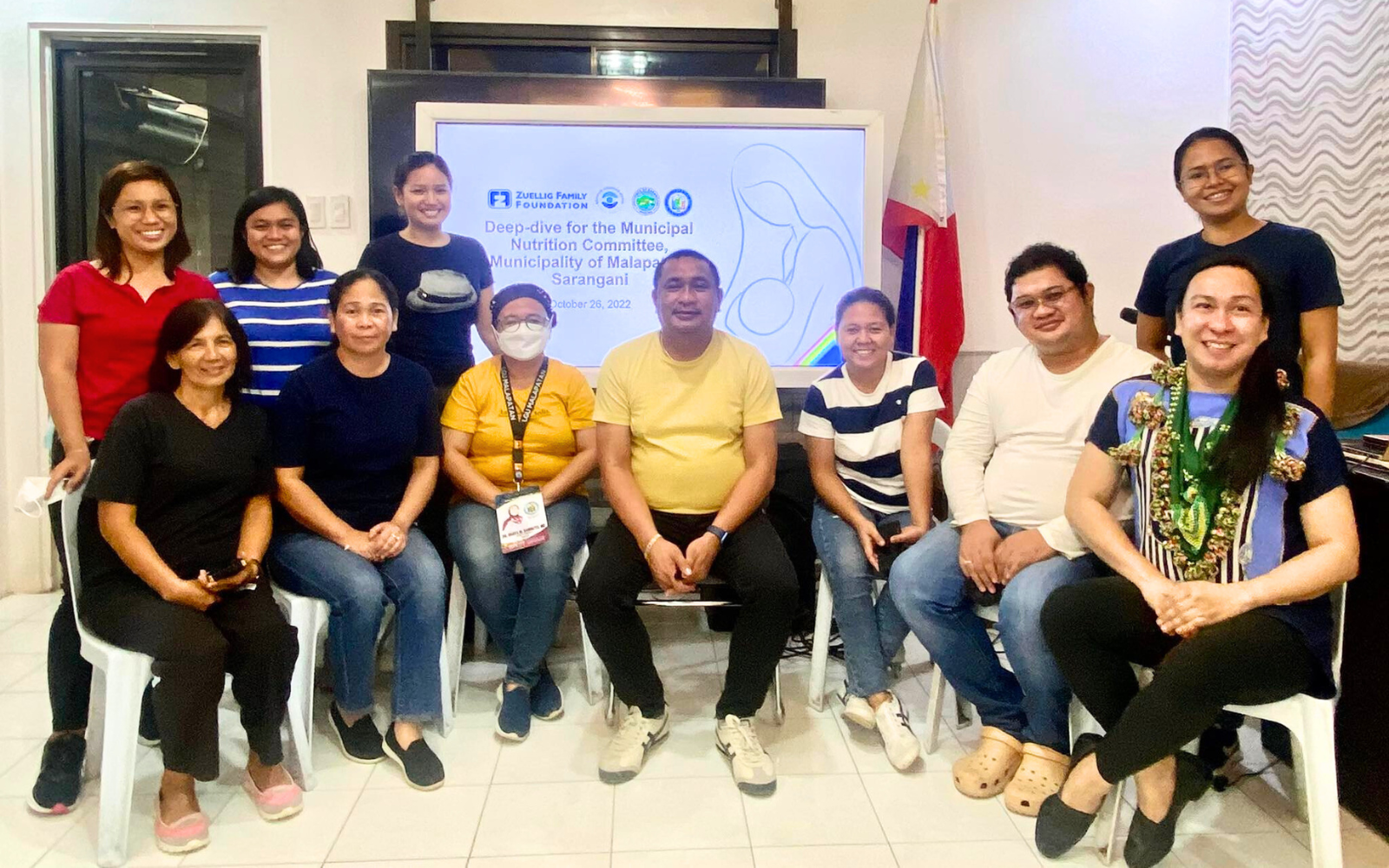
In August 2022, they formulated a comprehensive Nutrition Action Plan for 2023-2025 with ZFF and National Nutrition Council Region XII. This plan included interventions like micronutrient supplementation, deworming, infant and young child feeding promotion, lactation management, maternal health programs, supplementary feeding, and treatment facilities for severe malnutrition.
Other identified issues were food inaccessibility, low family income, and lack of community motivation and awareness. More than half the population (56.58%) lived below the poverty threshold, with decreasing fish catches affecting income. A family of five with farming as the main livelihood had an annual income of roughly Php 20,000.00, translating to Php 11.00 per meal per person per day.
Gulayan sa Malapatan: Addressing Food Insecurity
Mayor Sumbo launched the “Gulayan sa Malapatan” program to address food insecurity and malnutrition by incorporating it into his Executive Legislative Agenda. The initiative started with government employees planting various vegetables on a one-hectare land in Barangay Poblacion, aiming to inspire the community to follow suit. “If the people see that we’re doing these efforts, they will follow,” he said.
Vegetables planted included radish, cucumber, eggplant, pechay, string beans, upland kangkong, okra, green chili, bitter melon, bottle gourd, and spring onions, all rich in nutrients to combat deficiencies.
The program integrated with the Department of Social Welfare and Development’s “Cash for Work” program, engaging parents of malnourished children who planted vegetables in exchange for a Php 3,000.00 grant. Harvests supported local police and jail feeding programs, and produce was sold in markets. A weekly farmers’ market was also established.

The program reduced stunting and wasting rates in Malapatan, from 3.53% to 2.10% and from 0.54% to 0.43%, respectively, in one year. In March 2023, the local government unit passed an ordinance promoting communal vegetable gardens in schools, barangays, and households.
Mayor Sumbo also completed 95% of farm-to-market road constructions and is planning a local college to address long-term food insecurity and high teenage pregnancy rates (21% in 2022). He believes education will keep youths engaged and reduce early pregnancies.
Indeed, the MNGP helped Mayor Sumbo and his team identify health and nutrition problems in Malapatan and develop effective intervention programs. It emphasized the importance of monitoring children’s nutrition, shifting the responsibility from just the Municipal Nutrition Action Officer to all stakeholders.
Thanks to these realizations, the mayor and his team committed to improving the nutrition situation collaboratively. Malapatan is now in a better place. There are still a lot of problems to be solved, but they are working hard on getting there.

